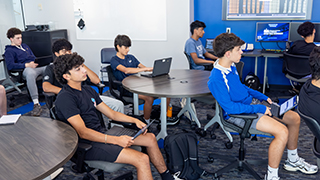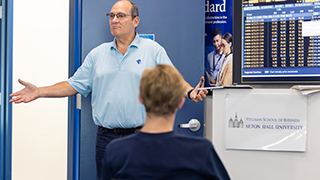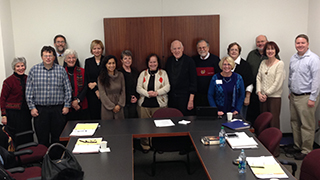Investing 101: Managing a Live Financial Portfolio Brought Finance to High School Students at Seton Hall
Wednesday, September 10, 2025

High school students listening to Mark Schild give a presentation in the Trading Room.
High school students had the opportunity this summer to take academically rigorous, college-prep coursework at Seton Hall University. As part of the University’s pre-college offerings, students can study a favorite subject, get ahead in a chosen field or explore areas not typically available in high school.
Held on Seton Hall’s South Orange, NJ, campus, these programs gave students the chance to meet with experienced faculty while engaging in subjects that spark their interests. Among this year’s offerings was Investing 101: Managing a Live Financial Portfolio, a week-long summer course designed to introduce participants to the fundamental principles of investing through immersive, hands-on learning.
Throughout the program, students explored core topics such as financial markets, investment strategies, risk management and portfolio diversification. Instruction combined interactive lectures, case studies and presentations from guest speakers in the finance industry, giving participants insight into the real-world decision-making process.
 Mark Schild, associate dean and finance professor, noted that the course also emphasized financial
literacy at a foundational level. Students not only learned how to build portfolios
but also how to budget in order to create the means to invest. Drawing on more than
25 years of experience running an investment firm, Schild said the program was designed
to provide “valuable real-world knowledge,” enhanced further by guest lecturers from
Bloomberg and other institutions.
Mark Schild, associate dean and finance professor, noted that the course also emphasized financial
literacy at a foundational level. Students not only learned how to build portfolios
but also how to budget in order to create the means to invest. Drawing on more than
25 years of experience running an investment firm, Schild said the program was designed
to provide “valuable real-world knowledge,” enhanced further by guest lecturers from
Bloomberg and other institutions.
A central feature of the course is its use of Seton Hall’s Center for Securities Trading and Business Analytics, where students accessed Bloomberg terminals and industry-standard technology. Participants applied classroom concepts by making investment decisions, utilizing simulated trading platforms, and monitoring the performance of their portfolios over the course of the week. Schild observed that students “immediately engaged in the stock trading simulations,” which led to thoughtful discussions about the best ways to invest. He added that he wished such an opportunity had been available early in his own career and hoped the program would inspire students to continue investing for themselves.
Through this experiential approach, students developed practical skills in portfolio construction, asset allocation and performance evaluation. The program is designed to give participants not only foundational financial knowledge but also firsthand exposure to the tools and practices used in professional finance.
Categories: Business






